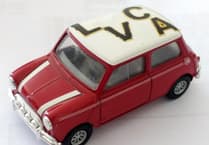SPEAKER for the evening meeting of Cheriton Fitzpaine Ladies’ Evening Group was Peter Downey, who was introduced by Rosemary Meikle, our adventurous Chairman Julia Sanders being on holiday in Equador.
Peter is a Salvationist, currently living in Stockleigh Pomeroy. He was brought up in the Salvation Army faith, and had for many years played in the Citadel Band in the South of England. After a heart operation he has retired, but still attends services in Exeter when possible.
Peter explained the origins of the Salvation Army to us, with a dry wit, answering questions as he went along. William Booth, the Founder, had been brought up in the Methodist Connexion and had learnt the art of preaching as a local preacher.
His family were not well off, and, aged 13, he went to work in a pawnbrokers. Seeing the misery of the people pawning their meagre goods affected him deeply and he decided to go to London, and try to make a difference.
William started preaching in a tent pitched in Whitechapel, which later became the East London Mission. His work was not always admired by the privileged classes, indeed Lord Shaftesbury thought him the Antichrist.
However, having started a free labour exchange and a match factory run on safer and better paid lines than Bryant and May, his efforts drew attention from some wealthier patrons, who helped him to buy a former Music Hall.
William married a like-minded lady, Catherine, and was always open to the ministry of women, in an age when very few denominations did.
Their distinctive bonnets with the large brims were intended to withstand any stones thrown at them!
A band was set up to attract the curious, and, as they were not sure of their reception, played in a circle with the preacher in the middle for protection. Soup kitchens fed the hungry, and eventually homes were set up for destitute children and adults. "Strawberry Fields", the Liverpool home referred to by the Beatles was one of them.
William decided on the name "The Salvation Army" to fight poverty and ignorance. Nowadays, when Childrens' Homes are a thing of the past, the Army concentrates on helping the homeless, preaching the word, and combating modern day slavery.
Peter had spent some time helping the Police with the last problem.
Two of us in the audience had had experience of the work of the Salvation Army, both at Charing Cross and The Royal London Hospitals, whilst training as nurses and midwives.
We remember: a young Salvation Army couple meeting the overnight trains from Scotland at Euston. They tried to persuade young girls to go to a hostel and then find work. Pimps would also be there enticing the girls into prostitution. Often a heated exchange would take place!
In Whitechapel, a big mens' hostel operated immediately opposite the hospital. Sometimes they ran out of beds, and the Casualty nurses would let the men sleep on the benches in outpatients, until the cleaners came on at 5am. It was also the practice for Medical Students to join the "Soup Runs" under the arches in the Thames where men huddled for warmth. It was not unusual for alcoholics to set light to themselves accidentally while drinking methylated spirits!
Over tea, Peter answered several questions, and was thanked warmly.
CLEO's next meeting is in the Parish Hall on Tuesday, March 7 at 7.30pm. We will have a talk and demonstration on willow weaving.
Mary Nunn




